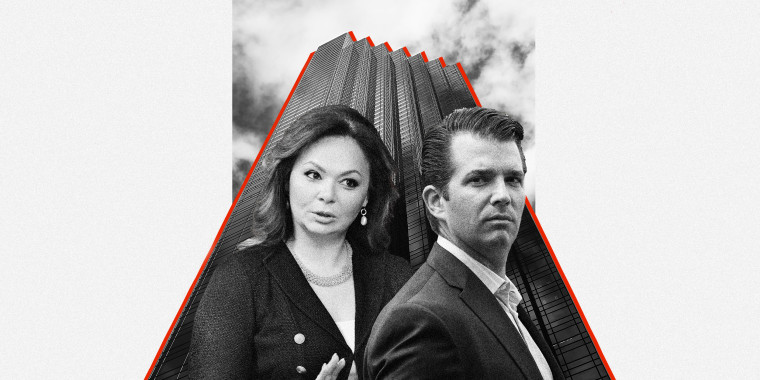Donald Trump Jr. and other Trump campaign officials involved in the June 2016 meeting with a Kremlin-linked lawyer were not charged with campaign finance violations in part because it would be difficult to prove the participants knew their conduct was unlawful, special counsel Robert Mueller's redacted report, released Thursday, said.
The meeting, which took place at Trump Tower in New York City on June 9, 2016 was pitched to Trump Jr. as the opportunity for members of Trump's presidential campaign to receive damaging information about Democratic nominee Hillary Clinton from Russian lawyer Natalia Veselnitskaya.
It is illegal for campaigns to accept help from a foreign government or from foreign nationals.
“On the facts here, the government would unlikely be able to prove beyond a reasonable doubt that the June 9 meeting participants had general knowledge that their conduct was unlawful," the report reads. "The investigation has not developed evidence that the participants in the meeting were familiar with the foreign-contribution ban or the application of federal law to the relevant factual context. The government does not have strong evidence of surreptitious behavior or efforts at concealment at the time of the June 9 meeting."
Rob Goldstone, a British music publicist who helped coordinate the meeting, told Trump Jr. in an email that the "crown prosecutor of Russia” would provide official documents and information that would incriminate Clinton and her connections with Russia as "part of Russia and its government's support for Mr. Trump."
Trump Jr. wrote of the possible dirt, "Seems we have some time and if it's what you say I love it especially later in the summer."
Mueller said in his report that investigators did not believe they could prove Trump Jr. acted "willfully" when he possibly violated campaign finance law.
"The Report confirms that the June 9, 2016 meeting was just what Don said it was, and nothing more, and that there was nothing improper about potentially listening to information," Trump Jr.'s attorney, Alan Futerfas, said in a statement Thursday, responding to the release of Mueller's report.
As a source for the Trump campaign, Veselnitskaya proved disappointing, as she did not provide the damaging information about Clinton that was promised.
Mueller also said in his report that his investigation found no "documentary" evidence that then-candidate Trump knew about the meeting in advance.
"According to written answers submitted by President Trump, he has no recollection of learning of the meeting at the time, and the Office found no documentary evidence showing that he was made aware of the meeting — or its Russian connection — before it occurred," Mueller wrote in his report.
That was an outstanding question, given some conflicting statements from those close to the matter. In 2017 testimony to the Senate Judiciary Committee, Trump Jr. said he could not remember if he told his father in advance. Last year, Trump's personal attorney, Rudy Giuliani, said he "would be surprised if [Trump] could remember" if he was informed in advance of the meeting.
The president's former longtime attorney Michael Cohen, who is set to start a three-year prison sentence after pleading guilty to a list of federal felonies, including two relating to paying off women who alleged affairs with the president on Trump's behalf, told Congress this year that he remembered Trump Jr. telling his father in advance.
Mueller wrote in his report that although Cohen "believed that Trump Jr. had previously discussed the meeting with his father," the attorney "was not involved in any such conversation."
Trump's misleading statement to the press
According to Mueller's report, Trump was aware of the existence of emails related to the Trump Tower meeting by June 2017.
In July 2017, senior White House aide Hope Hicks informed the president that The New York Times planned to publish a story about the meeting, Mueller wrote, and Trump became involved in the effort to craft a response.
In the days leading up to The Times' story, senior aides sought to fill Trump in on just how damaging the emails between Trump Jr. and Goldstone were, and scrambled to coordinate a message.
Hicks warned Trump that the emails were "really bad" and the story surrounding them would be "massive" once it broke, Mueller wrote, but Trump was "insistent that he did not want to talk about it and said he did not want details."
Trump at first instructed her to provide no comment, which she thought was "odd because he usually considered not responding to the press to be the ultimate sin," Mueller wrote.
Trump asked Hicks what the meeting had been about, to which Hicks said she was told it was "about Russian adoption."
"Then just say that," Trump responded, according to the report.
According to the report, Trump Jr. wanted the statement to say it was to "primarily" talk about the issue of Russian adoption. In text messages provided to Mueller, Hicks agreed with Trump Jr. but said his father didn't want that word included in the statement because "he was worried it invites questions."
Trump Jr. said that if the caveat was not included it would appear "as though I'm lying later when they inevitably leak something."
The statement ultimately given to The Times for their story publish on July 8, 2017 was the president's version — the one that declared the meeting was about adoption policy.
Trump Jr. had to issue subsequent statements once it became clear the initial response was misleading, and eventually disclosed the emails publicly once he became aware The Times was about to publish them in a subsequent story.
But Mueller concluded that because each of these misleading efforts was directed at the press, and that there was no evidence Trump sought to withhold information from or mislead Congress or the special counsel, it did not constitute obstruction of justice.

